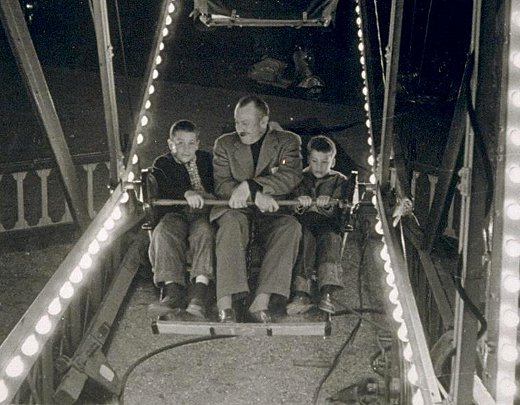You don’t have to keep watching the crappy version that leaked over the weekend.
Thursday, January 30, 2014
HBR Daily Stat: Lavish Praise Can Backfire in Some Cases
Children whose self-esteem was at least 1.3 standard deviations below average reacted to lavish praise (“You made an incredibly beautiful drawing”) by becoming less willing to take on challenges, possibly out of fear that they might not be able to perform as “incredibly” well in the future, according to a study led by Eddie Brummelman of Utrecht University in the Netherlands. Children with high self-esteem did the opposite, responding to lavish praise by seeking greater challenges. Although many educators encourage parents and teachers to shower praise on pupils, adults should resist the temptation in the case of children who appear to have low self-esteem, the researchers say.
Read more about the HBR Daily Stat.
Read more about the HBR Daily Stat.
Wednesday, January 29, 2014
Watch Music Bring Back Memories for Alzheimer's Patients
The Alive Inside documentary shows how songs can help people whose minds are deteriorating. Read more in the Atlantic.
That trailer reminds me of Naomi Feil's work with Alzheimer's patients. Below is a video of Naomi Feil, founder of Validation Therapy, as she shares a breakthrough moment of communication with Gladys Wilson, a woman who was diagnosed with Alzheimer's in 2000 and is virtually non-verbal.
(Thanks, Julia and Rita)
How Much Time Have You Wasted on Facebook?
Estimate the total amount of time you've spent on the site with this tool. Read more at TIME. (Thanks, Claire)
Not posting my crazy high number...
Not posting my crazy high number...
Monday, January 27, 2014
Murmuration
A chance encounter and shared moment with one of natures greatest and most fleeting phenomena. Watch the Vimeo video. (Thanks, +Julia Chou)
Sunday, January 26, 2014
Self esteem in leadership
Here's a take on self-esteem and role of compassion:
Bill George, former Chairman and CEO of Medtronic argues that biggest challenges in leadership lies within self in the form of self esteem. He says that leaders who fail are those who suffer from lack of strong sense of identity, lack of belief or respect for self. Compassion i.e. believing that we are here to make others grow, along with high internal standard for self respect guides leaders to be successful. Those who lack these qualities are driven by what the world calls as success (power, money etc) which he argues is a wrong measure of leader's effectiveness as it actually leads to powerlessness among leaders.And how to apply it to business:
Organizational change expert Paul Meshanko in his book "The Respect Effect" asserts that people with healthy self esteem perform at their best and treat others with respect and get the best of their people. He articulates, 8 steps to build a healthy self esteem:
1. Identify and be aware of skills and qualities that link closely to how you define successRead more in Forbes. (Thanks, CL)
2. Find out the set of strengths and plans for improving them further
3. Always explore ways and opportunities to enrich talent and experience
4. Make self as the base for comparison and others as a source of inspiration
5. Avoid berating self for past failures, instead accept them as learning sessions
6. Hold yourself accountable for actions, decisions and outcomes
7. Validate your self worth and abilities by talking to self
8. Focus on things you can control, not on things you can't
Questions are gifts
Loved this:
Questions are like gifts -- it's the thought behind them that the receiver really FEELS. We have to know the receiver to give the right gift and to ask the right question. Generic gifts and questions are all right, but personal gifts and questions feel better.
...So Craig and I don't ask "How was your day?" anymore. After a few years of practicing increasingly intimate question asking, now we find ourselves asking each other questions like these:
When did you feel loved today?
When did you feel lonely?
What did I do today that made you feel appreciated?
What did I say that made you feel unnoticed?
What can I do to help you right now?
I know. WEEEEEIRRD at first. But not after a while. Not any weirder than asking the same damn empty questions you've always asked that elicit the same damn empty answers you've always gotten...Read more in HuffPo. (Thanks, Jamie)
Saturday, January 25, 2014
Friday, January 24, 2014
Thursday, January 23, 2014
HBR Daily Stat: A Little Meditating Helps You Make Better Business Decisions
Research participants who had spent just 15 minutes in “mindfulness” meditation, focusing on their breathing, were 77% more likely than others to resist what’s known as the “sunk-cost bias,” the tendency to stick with a less-than-optimal strategy merely because a lot of money has been sunk into it, says a team led by Andrew C. Hafenbrack of Insead business school in France. In a fictional scenario, the participants had to decide whether to buy a highly efficient $10,000 machine shortly after spending $200,000 on equipment that was much less efficient (and couldn’t be sold). Meditation’s impact on the sunk-cost bias may have to do with its ability to improve mood and decrease people’s focus on the future and past, the researchers suggest.
Read more about the HBR Stat.
Read more about the HBR Stat.
20 Ways Sitting in Silence Can Completely Transform Your Life
I liked this learning:
8. OverstimulationCheck out Sam Gentoku McCree's post in TinyBuddha.
Whenever I went into town after retreat, the world seemed so loud and fast. I came to realize how much our senses have to process most of the time.
Silence taught me the importance of reducing the stimulation. Enjoy some quiet time everyday. The less you see and hear, the more settled your mind can become.
Wednesday, January 22, 2014
The Push Up Muscle Shirt | The Flattering Man
Just read about this. It looks kind of amazing. Beats getting a gym pass am I right?
You don’t want your privacy: Disney and the meat space data race
"MailChimp Chief Data Scientist is at Disney World this weekend wearing his RFID-equipped MagicBand. Here’s how he thinks the practice of digitally tracking consumers in the physical world will reach everywhere from theme parks to our homes."
One of the best pieces I have read all week. Read more at gigaom. (Thanks, Phil)
One of the best pieces I have read all week. Read more at gigaom. (Thanks, Phil)
How stores use your phone’s WiFi to track your shopping habits
I had no idea this was happening. Somewhat amazed at data sciences, and somewhat creeped out. Here's an example of what they can gather if you leave your WiFi on:
The average wait time at the back register is two minutes. Half of your customers have been in your store twice in a week. Ten percent of the people who come in your store never come near a register, meaning they don't buy anything. There are a lot of people not finding what they want. The big promotion on the east side entrance of your store was more successful at bringing people to purchase than the promotion on the west side of your store. Here's the hotspot in your store that draws the most users. The typical user comes in and purchases one thing. Ten percent of your users have been at more than one of your stores.Read more in Washington Post. (Thanks, Phil)
Running on Fumes in North Dakota
A young woman, lured to North Dakota for a truck-driving job in the oil industry, shares her agonizing existence in an isolated boomtown. Check out the mini documentary.
HBR Daily Stat: What People Really Care About When They Meet You: Are You a Good Person?
When people meet you, their impressions are formed more by their perceptions of your moral character than by your personal warmth (or lack thereof), suggests research by Geoffrey P. Goodwin, Jared Piazza, and Paul Rozin of the University of Pennsylvania. For example, in one study, research participants who were asked for their overall impressions of people rated those who were “cold” but had “good character” more positively than those who were warm but of bad character (5.59 versus 3.60 on a nine-point scale). The researchers’ finding about the importance of moral character—that is, whether you’re a good or bad person—contradicts recent theories that the two fundamental dimensions of perception are warmth and competence.
Read more at HBR.
Read more at HBR.
The case for meditation as a professional skill
Read more details about how to incorporate it into your life.
Meditation is my January Resolution. (Thanks, +Samantha Pearlman)
Meditation is my January Resolution. (Thanks, +Samantha Pearlman)
Why Warren Buffett’s Billion-Dollar Prize To Predict The Perfect NCAA Bracket Matters
Warren Buffet and Quicken Loans have teamed up for a $1b (yes billion) winning for anyone who gets the NCAA bracket right. The odds of predicting 63 perfect games is 1 in 9.2 quintillion (that’s 18 zeros). Read more in TechCrunch.
Tuesday, January 21, 2014
No Barbarians at the Gate; Instead, a Force for Change
It’s no longer an insult to be called an activist investor. Read more in DealBook.
Meet The Lion Whisperer And Hug With Lions
GoPro went to Africa with "lion whisperer" Kevin Richardson. Warning: this video contains lion hugs and other wild cuteness. (Thanks, +Samantha Pearlman)
Amazon Wants to Ship Your Package Before You Buy It
Amazon knows you so well they want to ship you your package before you order it. Craziness. Read more in the WSJ.
Make your soul grow
Another great one:
Back in 2006, a group of students at Xavier High School in New York City (one of whom, "JT," submitted this letter) were given an assignment by their English teacher, Ms. Lockwood, that was to test their persuasive writing skills: they were asked to write to their favourite author and ask him or her to visit the school. Five of those pupils chose Kurt Vonnegut. His thoughtful reply, seen below, was the only response the class received.Read his letter in Letters of Note. (Thanks, Vini)
Nothing good gets away
Loved this:
In November of 1958, John Steinbeck — the renowned author of, most notably, The Grapes of Wrath, East of Eden, and Of Mice and Men — received a letter from his eldest son, Thom, who was attending boarding school. In it, the teenager spoke of Susan, a young girl with whom he believed he had fallen in love.
Steinbeck replied the same day. His beautiful letter of advice can be enjoyed below.Read the letter in Letters of Note. (Thanks, +Sims Witherspoon)
For the Love of Money
Sam Polk writes about his experience being addicted to creating wealth. Read more in the NYT. (Thanks, Chris)
Monday, January 20, 2014
Wednesday, January 15, 2014
Tuesday, January 14, 2014
Beware Of The 5 lb. Bag Of Sugarless Gummy Bears On Amazon.com – The Reviews Are Priceless!
I cannot stop laughing.
Check out the reviews on Amazon and a summary of the best ones at SlightlyViral. (Thanks, Jenny)
Check out the reviews on Amazon and a summary of the best ones at SlightlyViral. (Thanks, Jenny)
HBR Management Tip of the Day: For a Stronger Attention Span, Take a Break (or a Nap)
"World-class competitors, from athletes to pianists, limit the arduous part of their practice routine to a maximum of about four hours each day. Rest is an equally important part of their training regimen, to restore their physical and mental energy. Without rest, our brains grow more depleted, often signified by distractedness, irritability, and fatigue. At work, all too often we try to “push through it,” even though there is no magical energy reserve waiting for us. To recharge, take a break; a short rest at midday reboots the brain for the rest of the day. If you can’t take a nap, try mindfulness meditation, which can serve as the mental equivalent of a weightlifting rep. Attention is a mental muscle—strengthen it with the right practice."
Read more in HBR.
Read more in HBR.
Sunday, January 12, 2014
Goodnight. Sleep Clean.
"Sleep, it turns out, may play a crucial role in our brain’s physiological maintenance. As your body sleeps, your brain is quite actively playing the part of mental janitor: It’s clearing out all of the junk that has accumulated as a result of your daily thinking."
Read more about how that happens in the NYT.
Read more about how that happens in the NYT.
Saturday, January 11, 2014
What mindfulness means to me (and how I practice it at home)
Friday, January 10, 2014
Australian National Science Agency Apologizes to Little Girl for Lack of Dragon Research
Read more in TIME. Check out some of the links too -- and see how they responded.
It's incredibly sweet.. (Thanks, +Claire Richard)
It's incredibly sweet.. (Thanks, +Claire Richard)
Wednesday, January 8, 2014
Scientists May Have Decoded Your Social Circle
"Perhaps there’s something hardwired into our brain as a consequence of evolution that determines how we structure our social world." Read more in the Atlantic. (Thanks, Becky)
HBR Daily Stat: Does Taking Paternity Leave Give Men a Longer Life?
Men who take time off from work to care for their children live longer than other men, sociologist Scott Coltrane writes in The Atlantic. According to a study in Sweden, fathers who took paternity leave in 1978 and 1979 had a 16% decreased death risk by 2001; those who took the longest leaves had the greatest benefits. The study says increased involvement in parenting may reduce some of the detrimental effects of traditional masculinity on men’s health behaviors.
Read more in the HBR Daily Stat.
Read more in the HBR Daily Stat.
Tuesday, January 7, 2014
The Septendecennial Sing-Along
This RadioLab podcast is surprising, but incredibly good. Worth 20 minutes if you are off on a long drive. (Great find, Alex)
Monday, January 6, 2014
Jesse Jacobs, Samovar Tea Lounge
Jesse Jacobs founded Samovar Tea Lounge in San Francisco about a decade ago, and now has three locations in San Francisco. Check a great clip about his perspective and mission for the lounge in the Habits of Entrepreneurs by +Leo Babauta.
Tech entrepreneurs revive communal living
Think a lot of these places could be great communities [SF Gate]. Reminds me of cohousing in Denmark. (Thanks, +Brandon Kearse)
The Hard-Won Lessons of the Solitary Years
An excerpt:
...I had noticed that friends going through breakups often took solace in the fact that they had learned from those failed romances. They had acquired important skills such as how to be vulnerable, how to set boundaries, how to listen and how to speak up. They had learned the art of compromise and forgiveness and how to love someone even when you don’t always like them. Through practice and repetition, they were mastering this exquisite, complicated dance, cultivating wisdom and muscle memory that could be successfully applied to future relationships.Read more in Modern Love. (Thanks +Brandon Kearse)
...
Being a single person searching for love teaches you that not everything is under your control. You can’t control whether the person you’ve fallen for will call. You can’t force yourself to have feelings for the nice guy your best friend fixed you up with. You have no way to know whether attending this or that event — a co-worker’s art opening, a neighbor’s housewarming — will lead to the chance encounter that will forever alter your life. You simply learn to do your best, and leave it at that...
Sunday, January 5, 2014
AJ And AJ: A Special Bond
Tom Rinaldi profiles the friendship between Alabama QB AJ McCarron and AJ Starr, the Crimson Tide assistant equipment manager, who has cerebral palsy. Check out the ESPN video.
Saturday, January 4, 2014
New Year's Resolution 2.0: How to Make It Work for You and Your Friends
Think this is a great idea:
I'm going to start with ZenHabit's Sea Change program. Excited to see how this goes. (Thanks, Becky)
For the first time in my life, I actually stuck to my New Year's resolution for 2013. My friends did too and we're already discussing what we're going to focus on for 2014. What sparked the change?
1. We commit to 12 one-month resolutions. Instead of trying to maintain one lofty goal for 365 days, we allow ourselves the opportunity to switch it up every month (in January, I committed to being a vegan; in February, I committed to reading four books).
Interestingly, some of these monthly resolutions end up becoming habits because we are so intently focused on doing just that one thing for a month. Twenty-one days to make a habit? Maybe. Thirty days? More likely..Read more in HuffPo.
I'm going to start with ZenHabit's Sea Change program. Excited to see how this goes. (Thanks, Becky)
Wednesday, January 1, 2014
HBR Management tip of the day // A Five-Minute Exercise to Boost Leadership
Would like to try this. Probably good as a team exercise, too.
When a new work group forms, people often make snap judgments about who is qualified to lead. The attitude with which you enter a new group — something completely within your control — can help boost your chances of leading it. To achieve higher status and more influence, get in the right mind-set before engaging with new teammates. Try this simple five-minute exercise: write about your ambitions and what you hope to achieve in life, and recall a time when you felt happy or powerful. Recent research shows that study subjects who did exactly that were more likely than others to speak up, steer decision making, and be viewed by their teammates as leaders — both in initial group meetings and in follow-up meetings two days later.Read more in HBR.
Dreaming of a hip-hop Christmas: Holiday jingles in a divided America
Never thought of this before:
Mood Media provides tunes (as well as smells from a 1,500-strong scent library) to over 300,000 American commercial locations. Family-friendly shops tend to shun raunchy Christmas lyrics such as Lady Gaga’s “Take off my stockings; we’re/ Out spreading Christmas cheer.” Mood Media offers “retail-appropriate”, non-explicit Christmas songs; that includes hip-hop tracks, such as “Toy Jackpot” by Blackalicious and “Christmas in Harlem” by Kanye West (“Won’t you come sit on my knee?/ And tell me everything that you want/’Cause, baby, I’m your Santa Claus”)
The segmentation of Christmas partly reflects the science that now goes into selling to smartphone-toting consumers, who are at once better-informed and more distracted as they shop. Retailers use “dayparting” to target music to such different audiences as daytime mothers or after-school teens. Restaurants use high-tempo songs to make lunch-time clients eat fast, and slow tunes to persuade evening diners to linger (and run up bar bills longer than a six-year-old’s letter to Santa)...Read more in the Economist. (Thanks, Tom)
How Netflix Reinvented HR
Read more at Culture from Reed Hastings. Lots of innovative things happening at Netflix. Check out the full slide deck before reading the discussion.
(Thanks, +Lucas Chapin)
(Thanks, +Lucas Chapin)
Subscribe to:
Posts (Atom)
Why Women Aren’t C.E.O.s, According to Women Who Almost Were
"It’s not a pipeline problem. It’s about loneliness, competition and deeply rooted barriers." Read more in the NYT .

-
"Why I don’t talk about race with White people." Read more in Medium .
-
Read more about Helena's work with the "30% Club" in the NYT . Thanks, +Leslie Labruto . Read past blog posts about Helen...




































